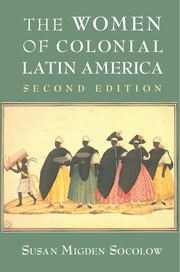Book contents
- Frontmatter
- Dedication
- Contents
- List of Figures
- Acknowledgments
- Introduction: Why Women?
- Chapter One Iberian Women in the Old World and the New
- Chapter Two Before Columbus: Women in Indigenous America and Africa
- Chapter Three Conquest and Colonization
- Chapter Four The Arrival of Iberian Women
- Chapter Five Women, Marriage, and Family
- Chapter Six Elite Women
- Chapter Seven The Brides of Christ and Other Religious Women
- Chapter Eight Women and Work
- Chapter Nine Women and Slavery
- Chapter Ten Women and Social Deviance
- Chapter Eleven Women and Enlightenment Reform
- Conclusion
- Documents
- Suggested Further Reading
- Index
- Plate section
- References
Chapter Seven - The Brides of Christ and Other Religious Women
Published online by Cambridge University Press: 05 February 2015
- Frontmatter
- Dedication
- Contents
- List of Figures
- Acknowledgments
- Introduction: Why Women?
- Chapter One Iberian Women in the Old World and the New
- Chapter Two Before Columbus: Women in Indigenous America and Africa
- Chapter Three Conquest and Colonization
- Chapter Four The Arrival of Iberian Women
- Chapter Five Women, Marriage, and Family
- Chapter Six Elite Women
- Chapter Seven The Brides of Christ and Other Religious Women
- Chapter Eight Women and Work
- Chapter Nine Women and Slavery
- Chapter Ten Women and Social Deviance
- Chapter Eleven Women and Enlightenment Reform
- Conclusion
- Documents
- Suggested Further Reading
- Index
- Plate section
- References
Summary
In the name of all powerful God and with his Divine Grace Amen. Be it known that I, Sor Juana Isabel San Martín de la Santísima Trinidad, born in this city, age 23, and legitimate daughter of don Manuel de San Martín and doña Isabel Hidalgo, inhabitants [of Buenos Aires]; being sane of body and with just reason and mental powers because of the infinite grace of God Our Lord, and finding myself a novitiate in the Monastery of Saint Catherine of Sena about to profess [as a nun], which I have anxiously desired for many years because I know that the difficulties and dangers of the world are an obstacle to serving God and achieving a state of perfection; having consulted frequently with God-fearing people of instruction who have approved my decision; I therefore have decided to draw up my last will and testament and renounce the temporal things of this world.
Colonial Latin America was a deeply religious society, a world in which all were called upon to subscribe to one dogma and one set of religious beliefs, that of the Holy Roman Catholic Church. The church was spiritually, ritually, and physically present (or perhaps omnipresent) throughout the colonies. Religion entered in many spheres of daily life, helping to organize the beliefs, social actions and interactions of all inhabitants of the region. Religion helped to define and enforce gender roles. Thus, it should come as no surprise that religion deeply affected Hispanic women, providing them with life choices, the arenas in which to organize their spiritual and social lives, and the opportunities to display personal piety.
Entering the convent of Santa Catalina de Siena that day in 1813, Juana Isabel San Martín was making a lifetime decision that thousands of women in colonial Latin American had made before her. Like all elite women, she had been encouraged “to take a state” – marry a man or marry God. Most chose the former, but an important group of women, like Juana, elected to enter female monasteries.
- Type
- Chapter
- Information
- The Women of Colonial Latin America , pp. 97 - 119Publisher: Cambridge University PressPrint publication year: 2015



